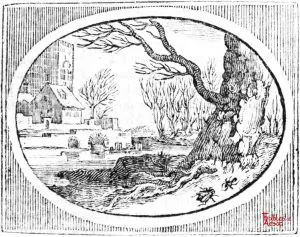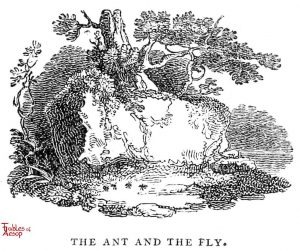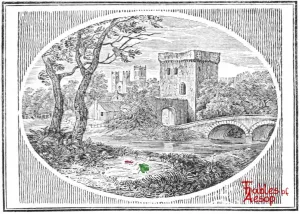An ant and fly disputed their respective merits. The fly boasted about being on royalty; the ant talked about toiling for a living. The ant won.
Work honestly and you won’t be scorned.

JBR Collection
An Ant and a Fly one day disputed as to their respective merits. “Vile creeping insect!” said the Fly to the Ant, “can you for a moment compare yourself with me? I soar on the wing like a bird. I enter the palaces of kings, and alight on the heads of princes, nay, of emperors, and only quit them to adorn the yet more attractive brow of beauty. Besides, I visit the altars of the gods. Not a sacrifice is offered but is first tasted by me. Every feast, too, is open to me. I eat and drink of the best, instead of living for days on two or three grains of corn as you do.” “All that’s very fine,” replied the Ant; “but listen to me. You boast of your feasting, but you know that your diet is not always so choice, and you are sometimes forced to eat what nothing should induce me to touch. As for alighting on the heads of kings and emperors, you know very well that whether you pitch on the head of an emperor, or of an ass (and it is as often on the one as the other), you are shaken off from both with impatience. And, then, the ‘altars of the gods,’ indeed! There and everywhere else you are looked upon as nothing but a nuisance. In the winter, too, while I feed at my ease on the fruit of my toil, what more common than to see your friends dying with cold, hunger, and fatigue? I lose my time now in talking to you. Chattering will fill neither my bin nor my cupboard.”

Samuel Croxall
ONE day there happened some words between the Ant and the Fly about precedency, and the point was argued with great warmth and eagerness on both sides. Says the Fly, It is well known what my pretensions are, and how justly they are grounded; there is never a sacrifice that is offered, but I always taste of the entrails, even before the Gods themselves. I have one of the uppermost seats at church, and frequent the altar as often as any body: I have a free admission at court; and can never want the king’s car, for I sometimes sit upon his shoulders. There is not a maid of honour, or handsome young creature comes in my way, but if I like her, I settle betwixt her balmy lips. And then I eat and drink the best of every thing, without having any occasion to work for my living. What is there that such country pusses as you enjoy, to be compared with a life like this? The Ant, who by this time had composed herself, replied with a great deal of temper, and no less severity: Indeed, to be a guest at an entertainment of the Gods, is a very great honour, if one is invited; but I should not care to be a disagreeable intruder any where. You talk of the king and the court, and the fine ladies there, with great familiarity; but as I have been getting in my harvest in summer, I have seen a certain person, under the town-walls, making a hearty meal upon something that is not so proper to be mentioned. As to your frequenting the altars, you are in the right to take sanctuary where you are like to meet with the least disturbance: but I have known people before now run to altars, and call it devotion, when they have been shut out of all good company, and had no where else to go. You don’t work for your living, you say; true: therefore when you have played away the summer, and winter comes, you have nothing to live upon: and, while you are starving with cold and hunger, I have a good warm house over my head, and plenty of provisions about me.
THE APPLICATION
This fable points out to us the different characters of those that recommend themselves in vain-glorious ways by false and borrowed lights; and of those whose real merit procures them a good esteem wherever they go. Poverty and folly having, at the same time, possession of any one man, cannot fail of making him an object of pity, if not of contempt; but, when an empty conceited pride happens to be joined with them, they render the creature in whom they meet, at the same time despicable and ridiculous. One who often attends at court, not because he has a place, but because he has not, should not value himself upon his condition. They who go to church out of vanity and curiosity, and not for pure devotion, should not value themselves upon their religion, for it is not worth a straw. They who eat at a three-penny ordinary, and sometimes not so well, should not boast either of their dinner or company. In short, no body is a better gentleman than he whose own honest industry supplies him with plenty of all necessaries; who is so well acquainted with honour, as never to say or do a mean and unjust thing; and who despises an idle scoundrel, but knows how to esteem men of his own principles. Such a one is a person of the first quality, though he has never a title, and ought to take place of every man who is not so good as himself.

Thomas Bewick (The Ant and The Fly)
In a dispute between the Ant and the Fly concerning precedency, the latter thus boasted: I have, said he, the uppermost seats at church, and even frequent the altars; I am taster to the gods, and a partaker of all their sacrifices; I am admitted into the palaces of kings, and enjoy myself at every entertainment provided for the princes of the earth, and all this without having occasion to labour. What have you to boast of, poor sorry drudge, crawling upon the earth, living in caverns and holes, and with constant exertion gathering up a grain of corn to support a wretched existence? Indeed! said the Ant, I pretend to none of these fine things. Visiting the great, and partaking of their festivals and sacrifices, might be entitled to some consideration, were you invited; but you are only an impudent intruder in such places. My time, indeed, is spent differently: I lead a life of industry, which is crowned with health and vigour, and I am constantly held up as an example of prudence and foresight. I provide for present comforts and future wants, and court not the favors, nor dread the frowns, of any one; while your laziness and vanity make you a beggarly intruder wherever you hope to get a present supply. You may, perhaps, sip honey one day, but on the next you batten on carrion; and having propagated a numerous progeny, equally as noxious and useless as yourself, I then behold you from my comfortable, warm, well-stored mansion, in the winter of your days, starving to death with hunger and cold.
APPLICATION.
The worthless part of mankind, who pass through the world without being of any service in it, and without acquiring the least reputation, seldom fail of adding empty pride to all their other failings, and behave with arrogance towards those who contribute to the comforts and happiness of society. They treat industrious persons as wretched drudges, appointed to labour for a poor subsistence, while they think themselves entitled to enjoy all the good things of this life, though they of all others least deserve them. But the worthy and industrious will generally find that the pride and extravagance of these idle flies, bring them at last to shame, if not to want, while their own honest labours secure a good name, a happy mind, and a sufficiency for their wants, if not a state of affluence. In short, no one is a better gentleman than he whose own honest industry supplies him with all necessaries, and who pretends to no more acquaintance with honour than never to say or do a mean or an unjust thing.

L’Estrange version
There happen’d a warm dispute betwixt an ant and a fly. Why, where’s the honour, or the pleasure in the world, says the fly, that I have not my part in? Are not all temples and palaces open to me? Am not I the taster to gods and princes, in all their sacrifices and entertainments? Am I not serv’d in gold and silver? And is not my meat and drink still of the best? And all this, without either mony or pains. I trample upon crowns, and kiss what ladies lips I please. And what have you now to pretend to all this while? Why, says the ant, you value your self upon the access you have to the altars of the gods, the cabinets of princes, and to all publick feasts and collations: and what’s all this but the access of an intruder, not of a guest. For people are so far from liking your company, that they kill ye as fast as they can catch ye. You’re a plague to ’em wherever you come. Your very breath has maggots in’t, and for the kisse you brag of, what is it but the perfume of the last dunghill you touch’d upon, once remov’d? For my part I live upon what’s my own, and work honestly in the summer to maintain my self in the winter; whereas the whole course of your scandalous life, is only cheating or sharping, one half of the year, and starving, the other.
Moral
Here’s an emblem of industry, and luxury, set forth at large: with the sober advantages, and the scandalous excesses of the one and of the other.

Apes et Musca
Apes et musca contendebant quae earum esset potentior, et dixit musca, “Cum tu et tui similes multo labore et ingenio mel ex floribus collegeritis et in cellulis vestris, quas item mirifice construitis, toto anno collocaveritis, homo in momento unius diei totum laborem vestrum sibi usurpat et, quod gravius est, vos ipsas interficit, et ego et mei similes postea de labore vestro comedimus. Et videtis quod ego, si mihi placet, iuxta regem sedeo vel, si magis voluero, super caput ipsius sublimis exsisto. Sed vos, si veneritis in conspectum regis vel ei appropinquare volueritis, continuo repellemini.” Tunc apes respondit, “Gloriam tuam, quia vana est, audire non possum. Sed hoc te volo scire: quanto te in altiori loco videro, tanto te viliorem habeo.”
Perry #521


